
Charcoal has become one of the newest trends in the health and wellness industry, including dental care. People are using many types of charcoal to clean and naturally whiten their teeth.
Today, you can find various toothpaste products on the market that feature activated charcoal in their ingredients. But is it really a safe and effective way to achieve whiter teeth? Or, is it much better to go for a different whitening method instead?
As a trusted provider of dental services in Lakeville, Miller Comfort Dental is here to give you advice on this. With that being said, here's everything you need to know about charcoal toothpaste.
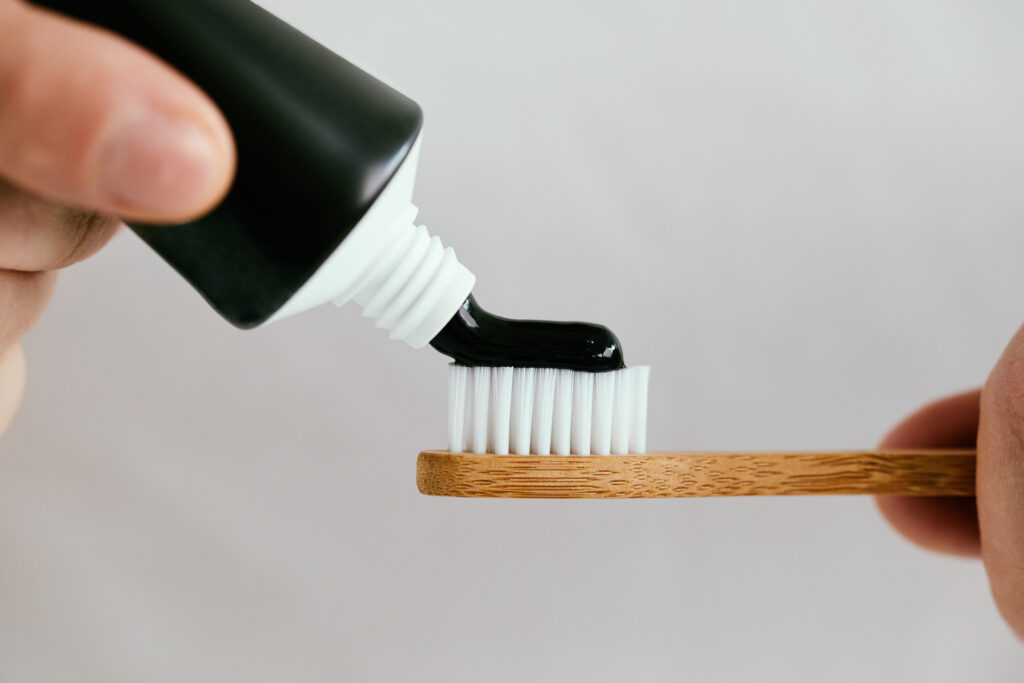
Charcoal is a solid form of black carbon produced by heating organic material to its basic form. It becomes “activated” when it is burned at even higher temperatures.
Activated charcoal is a porous and highly absorbent material that draws out certain toxins, making it a popular ingredient added to cosmetic and toothpaste products.
The use of fine and abrasive grains in activated charcoal toothpaste is intended to give you brighter and whiter teeth. It works similarly to baking soda, a tried and tested mild abrasive found in the majority of toothpastes.
As a mildly abrasive substance, activated charcoal toothpaste may help lighten and remove surface stains on your teeth to a certain degree. It can also prevent further staining that may occur after professional cleaning.
Research has also revealed that activated charcoal binds with acidic compounds to increase the pH level of your oral cavity. As a result, it helps remove plaque and bacteria that can cause bad breath, also known as halitosis.
There was one study published in 2019 comparing multiple types of whitening toothpastes and their effectiveness. In the study, researchers found that while the toothpaste with activated charcoal performed better than the control toothpaste, it did not perform as well as other solutions. However, overall, there is very limited scientific evidence and peer reviewed studies proving whether activated charcoal is effective at whitening teeth.
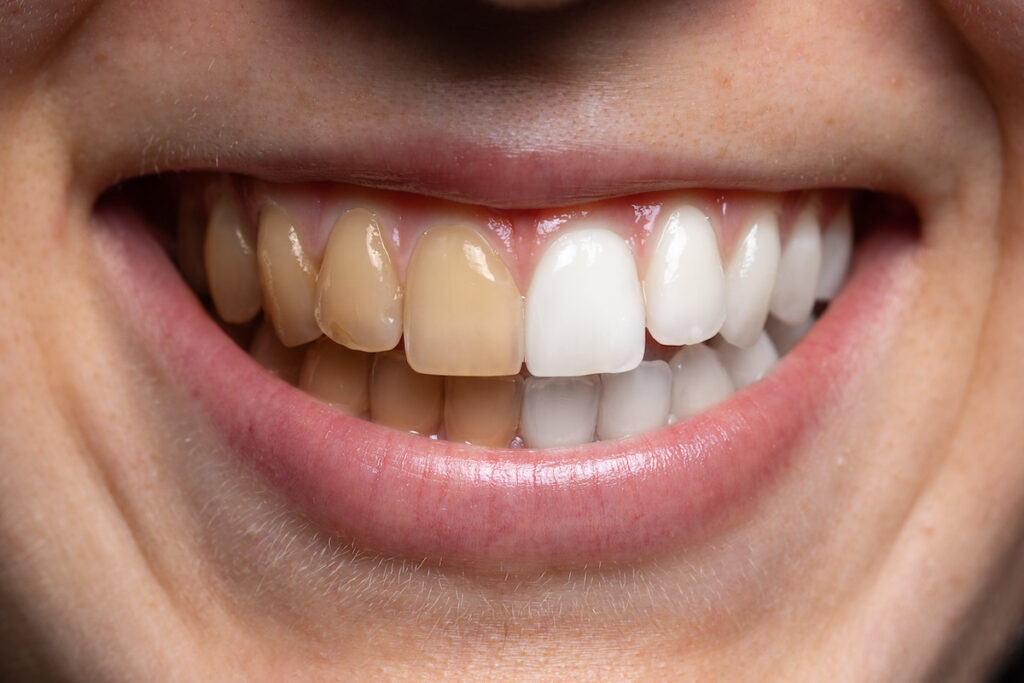
There is a significant difference between teeth whitening and surface stain removal. Although activated charcoal can help absorb surface stains on your teeth, it does not produce the same result for natural whitening.
Extrinsic stains, also referred to as surface stains, gradually accumulate on the enamel. It is the thin, outermost layer of the teeth that protects them against physical or chemical damage.
The accumulation of stains on the enamel layer is due to certain substances found in coffee, cigarette, red wine, and other stain-producing foods.
These extrinsic stains affect the outer appearance. Using toothpaste with activated charcoal helps remove surface stains effectively for brighter-looking teeth.
Intrinsic stains involve deep, dark discoloration that occurs within the tooth. They can indicate underlying dental or oral health issues that need to be addressed.
These stains may be caused by weak enamel, oral injury or trauma, overexposure to fluoride, or using certain types of medications (tetracycline).
Unlike surface stains, intrinsic stains can be more difficult to remove. They usually require in-office whitening or bleaching treatments that deeply penetrate the layers of the teeth.
Thus, you cannot easily lighten the color of your teeth using only whitening charcoal toothpastes. Charcoal does not work for removing intrinsic stains because the whitening process involves a different mechanism.
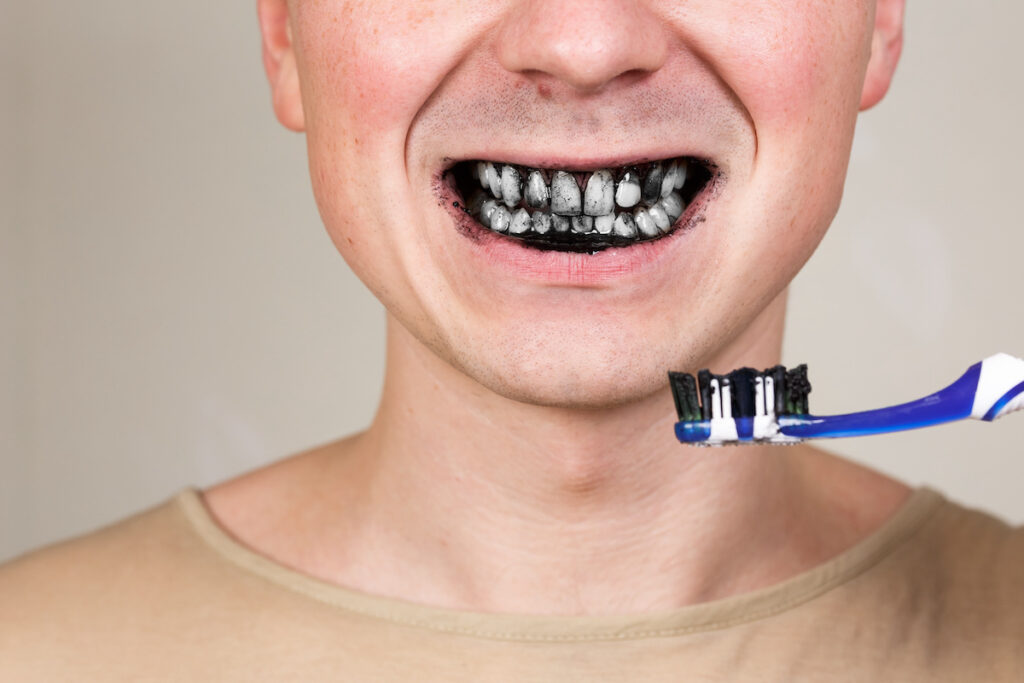
The American Dental Association (ADA) advises patients against the use of whitening charcoal toothpaste as the claims are not supported by any scientific evidence. Further studies are necessary to determine its effectiveness, safety, and long-term effects.
Instead of giving you whiter teeth, charcoal-based toothpastes have the potential to harm your teeth and gums. Below are some of the risks you need to be aware of.
Most dental care products are designed for gentle cleaning and removal of stains from the surface of the teeth. However, charcoal whitening toothpaste is a highly abrasive substance that poses a danger to the outer layer of the tooth.
Although its grittiness can remove plaque and surface stains, charcoal toothpaste also wears down the enamel with repeated usage. This erosion leads to staining and the exposure of dentin, the inner layer of the tooth.
Once exposed, this calcified tissue can make your teeth more sensitive and look more yellow. The loss of the tooth structure, such as dentin, also increases the risk of other dental complications, including:

Fluoride is commonly added to toothpastes to help strengthen the enamel. It is effective in preventing tooth decay and cavities.
In general, toothpastes that contain 1,350 to 1,500 parts per million (ppm) of fluoride are considered the most effective. Many ADA-authorized toothpastes have this ppm ratio of fluoride.
However, it has been found that there is a lack of recommended fluoride content in many charcoal-based dental products. For this reason, the ADA has warned people against most charcoal toothpaste brands available on the market.
The lack of fluoride and other beneficial ingredients in a toothpaste increases one’s risk for dental caries or other oral diseases. A 2019 review in the British Dental Journal also stated that charcoal offers little protection against tooth decay.
Another risk associated with the use of charcoal toothpaste is that it can cause stains. With frequent use, it can leave behind a black or gray outline on your gums and teeth.
There is a higher chance of charcoal particles building up in the cracks and crevices, especially those with older teeth. This leads people to brush their teeth harder to remove the particles, exacerbating its potential abrasive effects.
Charcoal’s effect on the materials used for various dental restorations are currently unknown. However, it has been observed that the accumulation of charcoal particles, leaving black or gray specks may be possible.
The lack of scientific evidence makes it difficult to determine whether charcoal toothpaste works for white fillings, veneers, crowns, and bridges.
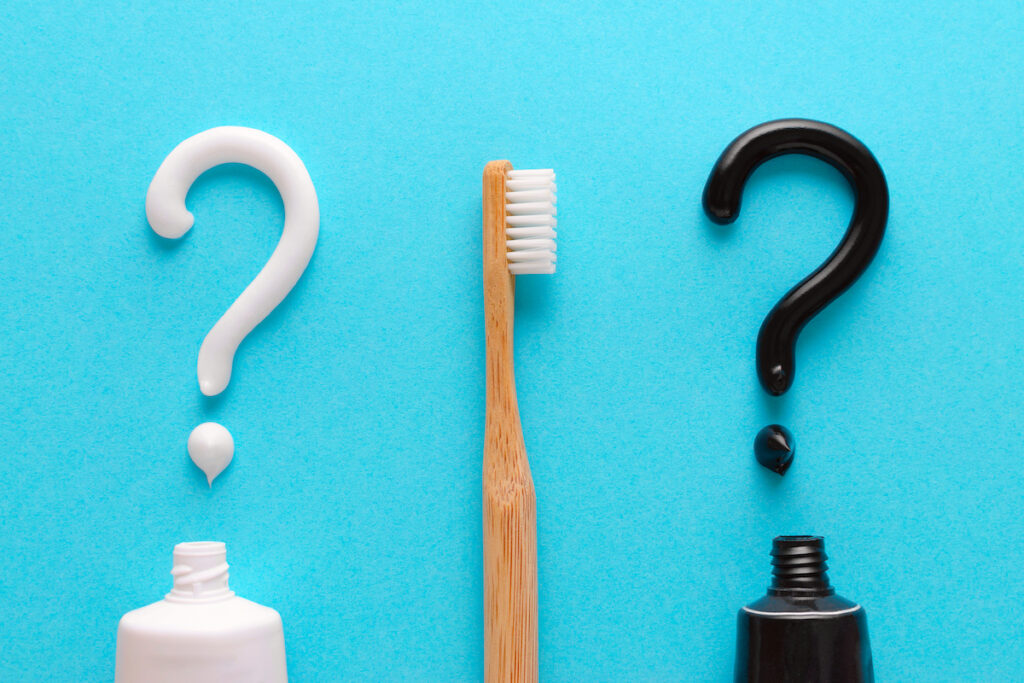
You can use charcoal toothpaste to help remove surface stains and serve as a supplement to your regular toothpaste. But keep in mind that using activated charcoal toothpaste alone will most likely not give you whiter teeth. Other products on the market have been shown to be far more effective.
When using this product, be careful and always brush your teeth gently. This prevents the surface enamel from wearing down, which can make your teeth more vulnerable to staining.
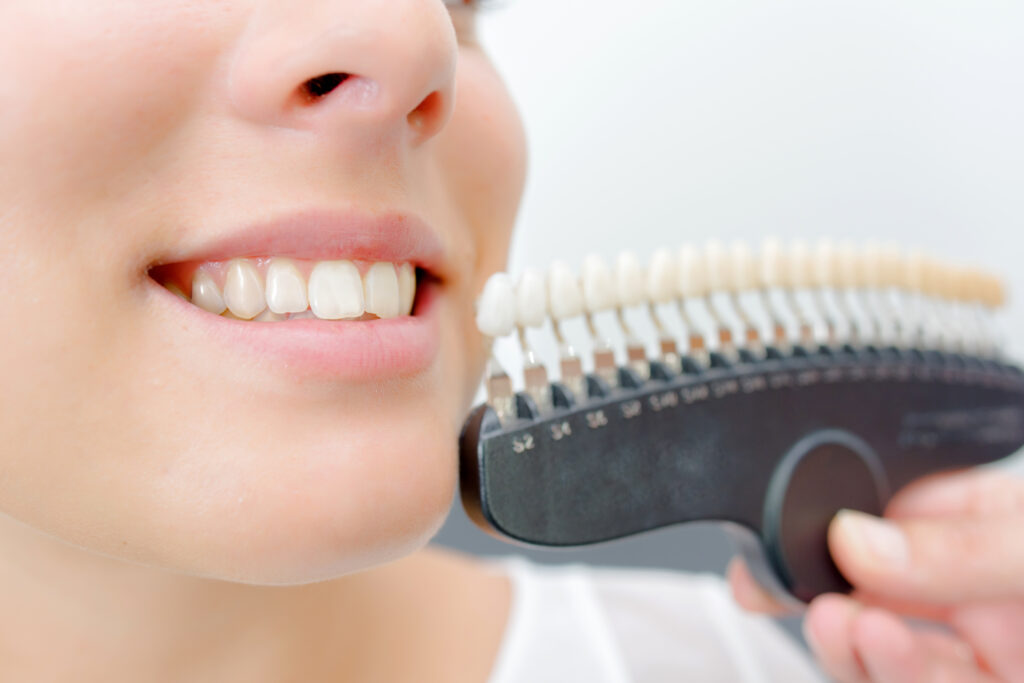
If you are looking to achieve whiter teeth, there are numerous safe and effective whitening options you can consider. Most of these solutions, including over-the-counter (OTC) products, are approved by the ADA.
Whitening toothpastes help remove surface stains and can lighten teeth by about one shade. It is recommended to choose a whitening toothpaste that has the ADA Seal of Acceptance.
With this seal, you can guarantee that the toothpaste is safe for your teeth without any harmful side effects. These products also provide whitening while protecting the enamel.
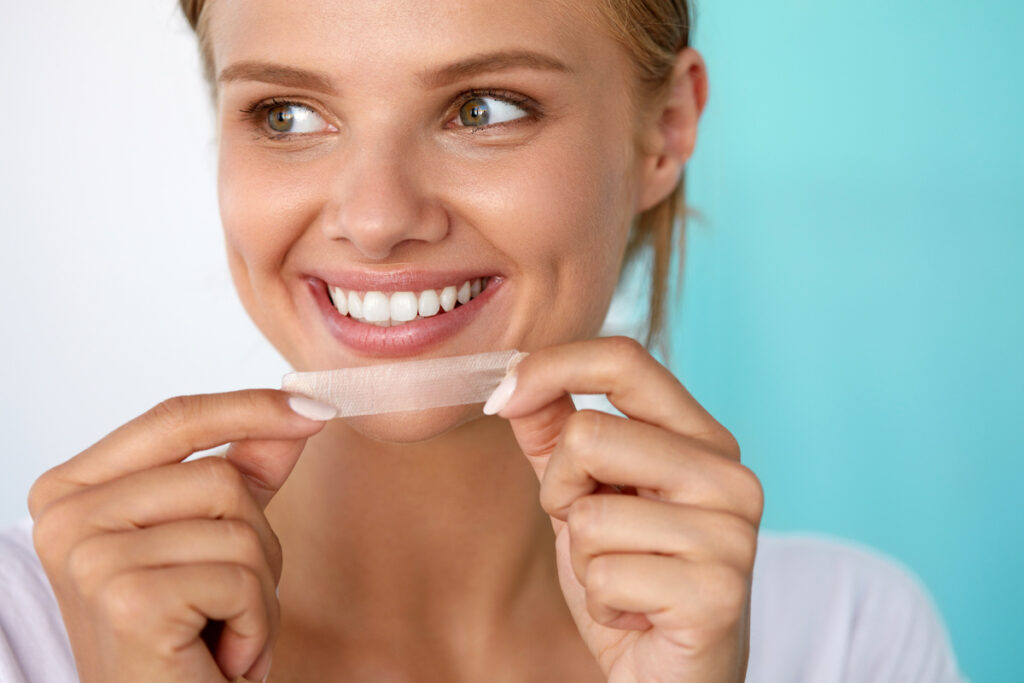
Whitening strips are coated with a thin layer of peroxide-based gel. The active ingredients in these strips may vary, with hydrogen peroxide and carbamide peroxide being the most common.
These dental whitening products help bleach surface stains on your teeth. They also remove intrinsic stains by deeply penetrating the enamel and dentin.
It is important to follow the label’s instructions for best results. If used incorrectly, whitening strips can harm your teeth.
Maintaining a good dental regimen is a natural way to keep your teeth healthy and white. Here are some ways to take care of your teeth at home:
Other alternatives to teeth whitening include baking soda and hydrogen peroxide. If you are considering these options, it is best to consult your dentist first to know if they are safe for you.
When it comes to the safest and most effective option, the whitening treatments offered at a dentist’s office are still the best. You can be sure that the procedure is performed by qualified and skilled professionals.
More than teeth whitening, dentists can provide you with well-rounded dental care. That’s why they evaluate your teeth first and check for any possible issues, like enamel loss or cavities, that may cause discoloration.
With in-office treatment, the whitening solution is applied directly to your teeth. They may be combined with a laser, special light, or heat. In-office whitening treatments can give you more dramatic results than OTC products.
Take note that commercial whitening products or at-home methods may not whiten all teeth. A dentist can help you find the most appropriate solution to achieve a whiter and brighter smile.
Get professional teeth whitening today at Miller Comfort Dental. Our family-oriented practice in Lakeville consists of dentists who are knowledgeable in modern whitening and bleaching procedures. Contact us today to schedule an appointment.